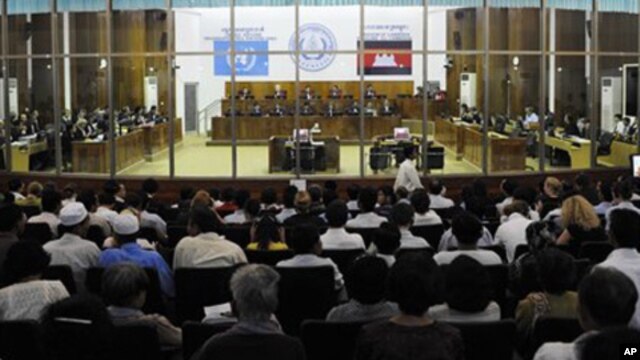23 January 2013
PHNOM PENH - Around 300 Cambodian staff members at the UN-backed Khmer
Rouge tribunal say they will walk out of their positions if their
salaries are not paid.
The staff members have not been paid since December, at a court that has been hounded by financial difficulties amid allegations of mismanagement and corruption, even as it seeks to try three Khmer Rouge leaders for atrocity crimes.
The 300 staff members signed a petition demanding their salaries from the Cambodian side of the court, which is a hybrid mix of local judges, prosecutors and staff and their international counterparts.
The staff are from the Cambodian translation and management offices, as well as the Supreme Court Chamber, tribunal spokesman Neth Pheaktra told VOA Khmer. They asked about their salaries for December and January and requested a “continuous contract” to be renewed annually, he said.
“If this lasts, it will impact the trial of Case 002,” he said, referring to the atrocity crimes trial of Khmer Rouge leaders Nuon Chea, Khieu Samphan and Ieng Sary.
The international side of the court also has “a challenging financial situation,” court spokesman Lars Olsen said, “but not as bad as the national side.”
The financial challenges of the court come at a time of other concerns, with two leaders—Nuon Chea and Khieu Samphan—currently hospitalized, and Ieng Sary recently out of an extended stay in the hospital last year, renewing fears they will not see their trial to the end.
Chhang Youk, director of the Documentation Center of Cambodia, said the administration section of the court should work to prevent financing woes “that could impact the feeling of the staff.”
The staff members have not been paid since December, at a court that has been hounded by financial difficulties amid allegations of mismanagement and corruption, even as it seeks to try three Khmer Rouge leaders for atrocity crimes.
The 300 staff members signed a petition demanding their salaries from the Cambodian side of the court, which is a hybrid mix of local judges, prosecutors and staff and their international counterparts.
The staff are from the Cambodian translation and management offices, as well as the Supreme Court Chamber, tribunal spokesman Neth Pheaktra told VOA Khmer. They asked about their salaries for December and January and requested a “continuous contract” to be renewed annually, he said.
“If this lasts, it will impact the trial of Case 002,” he said, referring to the atrocity crimes trial of Khmer Rouge leaders Nuon Chea, Khieu Samphan and Ieng Sary.
The international side of the court also has “a challenging financial situation,” court spokesman Lars Olsen said, “but not as bad as the national side.”
The financial challenges of the court come at a time of other concerns, with two leaders—Nuon Chea and Khieu Samphan—currently hospitalized, and Ieng Sary recently out of an extended stay in the hospital last year, renewing fears they will not see their trial to the end.
Chhang Youk, director of the Documentation Center of Cambodia, said the administration section of the court should work to prevent financing woes “that could impact the feeling of the staff.”


No comments:
Post a Comment